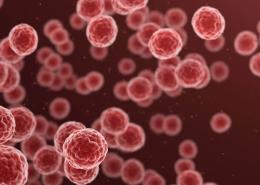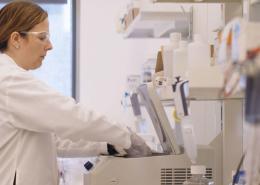Cancer Biomarkers: Paving the Way for Better Lung Cancer Treatment

Receiving a lung cancer diagnosis may inspire a lot of questions: Will my cancer spread? What are the best treatment options for my type of lung cancer? How well do treatments work?
There are no one-size-fits-all answers to questions about lung cancer—and that can be a good thing. Scientific advances have led to the practice of “precision medicine” or treatments tailored to patients based on the genes and proteins found in their tumor. In cancer treatment, it involves looking at changes in the molecular makeup of cancer cells to create a care plan that may be tailored and targeted.1
With researchers increasingly focused on precision medicine approaches that rely on cancer biomarkers, scientists continue to develop potential treatment options that can be personalized for each patient.
"We have more options for patients than we've ever had before," says Kirsten Duncan, PharmD, U.S. Medical Director, Lung Cancer at Pfizer. "Our hope is that these changes will continue to improve overall survival, and these patients will have the potential for a longer lifespan with a much-improved quality of life."
Let's explore some of these developments and where this exciting field is headed.
What Is a Biomarker?
Biomarkers are measurable substances in your tissue or blood that can indicate normal or abnormal processes in your body.2 For instance, biomarkers can be used to indicate the presence of a disease, if an existing illness has progressed, or the effects of treatment.2
Routine blood tests are often used to check certain biomarkers including, cholesterol levels to assess the risk of coronary artery disease or high blood sugar to diagnose diabetes.3,4 Biomarkers can also be used to check for genes, proteins and other substances to learn more information about a tumor. Testing for cancer biomarkers can also be called tumor testing, genomic testing or somatic testing.5
"Think of a biomarker in cancer as a fingerprint specific to a molecular or genomic alteration or mutation," says Stan Krulewicz, Senior Medical Director and Precision Medicine Team Lead in the oncology division of Pfizer's U.S. Medical Affairs. "The tumor cell, whether it's lung cancer or any other type of cancer, creates a unique fingerprint with the biomarker at the molecular level."
Biomarkers paint a more detailed picture of your cancer, including its genetic characteristics, how aggressive it is, and its relationship to your immune system. Using this information, your doctor can suggest treatment options that target your specific cancer.5
"It's important to have proper identification of molecular biomarkers as well as PD-L1, a protein that helps keep immune cells from attacking normal cells in the body," Krulewicz says. "It's a great opportunity for prescribers and patients to have a better understanding of the clinical characteristics of a tumor and also to provide approved biomarker-directed therapies in the lung cancer setting."
How Do You Test for a Biomarker?
Biomarker testing is important because it helps your doctor decide if you may benefit from any biomarker-based drug therapies approved by the U.S. Food & Drug Administration (FDA).5 These options help to provide an individualized approach based on the precise characteristics of your tumor.
Two cancer biomarker testing methods exist: tissue biopsy and liquid biopsy. A tissue biopsy is a more traditional, invasive method that tests a tissue sample collected directly from the tumor; a liquid biopsy is a less-invasive blood sample analysis that looks for circulating tumor DNA (ctDNA) floating in your bloodstream.6
"This is an evolving, exciting field. Tumor tissue biopsy remains the gold standard. However, liquid biopsy and ctDNA have emerging roles and are complementary in terms of providing molecular profiling," says Duncan. "This is particularly important for lung cancer because, often, there's insufficient tumor tissue for testing. That prohibits molecular profiling, and thus, treatment optimization."
Advancements Since the Early 2000s
Since the early 2000s, researchers have made significant advancements in understanding lung cancer biomarkers and developing related therapies. An FDA-approved medicine for EGFR-mutated non-small cell lung cancer (NSCLC) was the initial step.7 This mutation alone is responsible for 10% to 15% of lung cancers in the United States.8
Over the last 15 years, researchers have pinpointed more than 20 biomarkers specific to lung cancer.6 Most are linked to lung adenocarcinoma, a subtype of NSCLC,5 which accounts for 30% of all lung cancer cases.9 FDA-approved drugs, including targeted therapies, exist for eight of these biomarkers in lung cancer: EGFR, ALK, ROS1, BRAF V600E, NTRK, MET, RET, KRAS, HER-2, and PD-L1 expression.10 Work is ongoing to unearth biomarkers for other types of lung cancer.
Researchers also may make use of next-generation sequencing, a technique to assess a high number of biomarkers in a short period of time. This method analyzes genetic material of a piece of your tissue, searching for multiple mutations simultaneously.11
The Future of Cancer Biomarkers
Alongside efforts to identify additional biomarkers, investigators are also seeking to conquer targeted therapy resistance.12
"Resistance to these targeted therapies is often inevitable for some patients and is, generally, the cause of tumor progression," Duncan explains. "We have so much to learn about what to do once a patient develops a resistant mutation. How do we alter their care?"
By using next-generation sequencing, researchers are delving into what prompts resistance and how it works. Their findings may lead to novel approaches and new potential lung cancer treatment options that could hopefully delay, overcome, or prevent therapy resistance altogether, Krulewicz notes. These efforts could also lead investigators to identify additional unrecognized mutations, he says.
Efforts are also underway to improve testing for biomarkers among NSCLC patients. Currently, most patients receive testing for at least one biomarker before starting their first therapy, but less than 50% are tested for the five most common biomarkers.13
"It could be a lack of insurance, a lack of awareness, or a lack of access. For example, we know there can be differences between rural and urban practices in having access to testing," Duncan adds. "There are many efforts across multiple organizations and patient advocacy groups to improve utilization of next-generation sequencing for biomarker testing."
Precision medicine is about an individualized treatment journey. As these approaches become more accessible, the ideal becomes more realistic . "As we look toward the future, specifically with precision medicine, we'll be better able to deliver the right care to the right patient at the right time," Duncan says.
![]()






